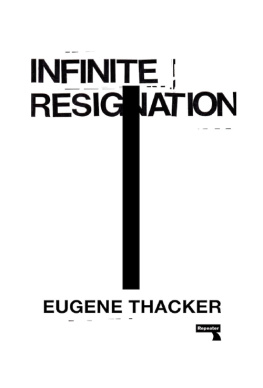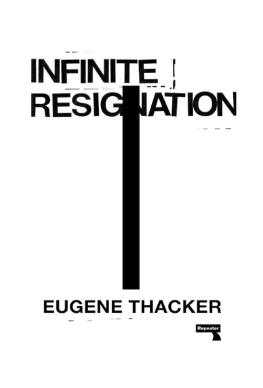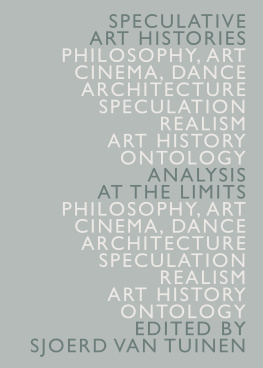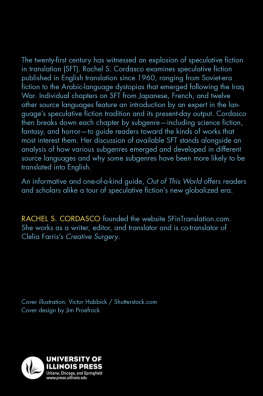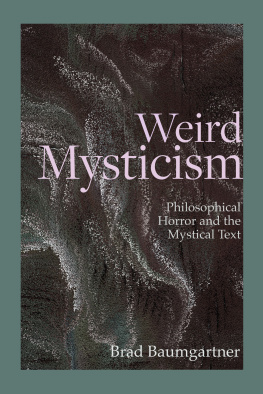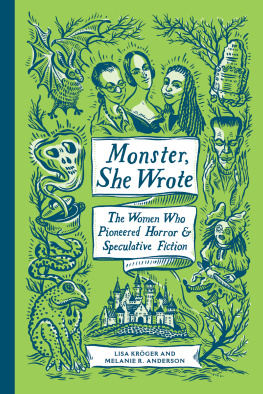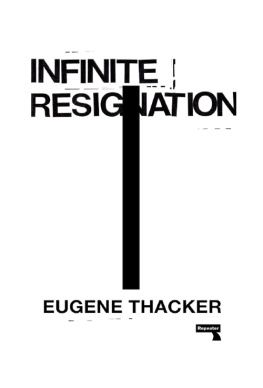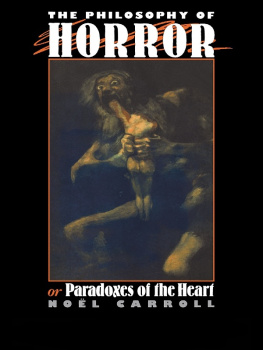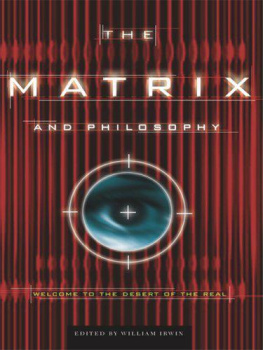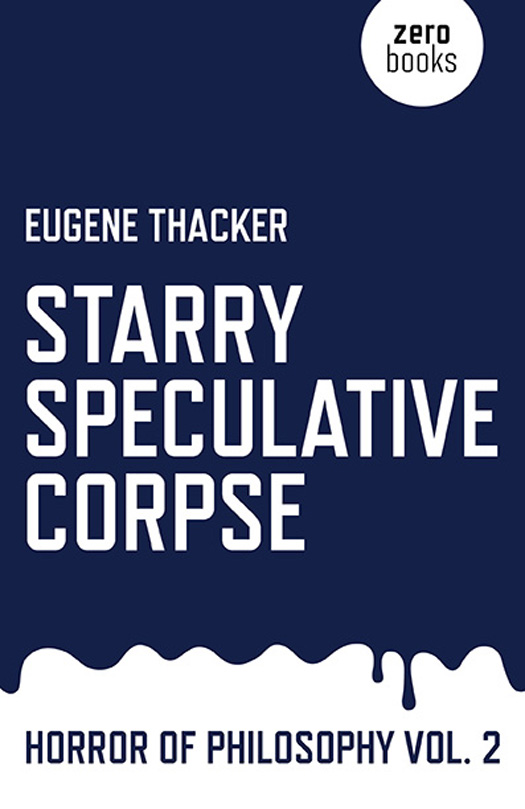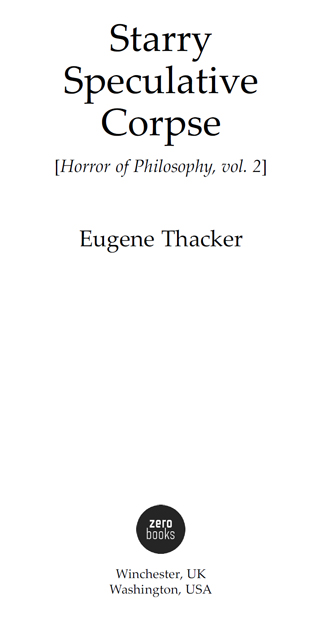First published by Zero Books, 2015
Zero Books is an imprint of John Hunt Publishing Ltd., Laurel House, Station Approach,
Alresford, Hants, SO24 9JH, UK
www.johnhuntpublishing.com
www.zero-books.net
For distributor details and how to order please visit the Ordering section on our website.
Text copyright: Eugene Thacker 2014
ISBN: 978 1 78279 891 0
All rights reserved. Except for brief quotations in critical articles or reviews, no part of this book may be reproduced in any manner without prior written permission from the publishers.
The rights of Eugene Thacker as author have been asserted in accordance with the Copyright, Designs and Patents Act 1988.
A CIP catalogue record for this book is available from the British Library.
Design: Stuart Davies
Printed and bound by CPI Group (UK) Ltd, Croydon, CR0 4YY, UK
We operate a distinctive and ethical publishing philosophy in all areas of our business, from our global network of authors to production and worldwide distribution.
Also in the series:
In the Dust of This Planet (Horror of Philosophy, vol. 1)
Tentacles Longer Than Night (Horror of Philosophy, vol. 3)
1
Starry Speculative Corpse
Descartes Demon. Sometime around 1639, Ren Descartes sat down at his desk to write. At issue for him was a simple question concerning knowledge. Philosophy, theology, mathematics, astronomy, medicine, the arts, and the natural sciences all claim to know things. From them a cumulative understanding of the self, of others, of the world, and of the cosmos is made possible. But how do we know that what we know is actually true? What is the foundation on which these disparate fields of knowledge are based? Are there questions that cannot or should not be asked, lest they undermine the knowledge they are designed to produce? How much uncertainty is tolerated before knowledge becomes doubt, and when does doubt come to a stop, if ever?
An abyss opens up. For Descartes this was a personal as well as a philosophical problem. As he writes, Some years ago I noticed how many false things I had accepted as true in my childhood, and how doubtful were the things that I subsequently built on them and therefore that, once in a lifetime, everything should be completely overturned and I should begin again from the most basic foundations
Being the astute thinker that he was, Descartes set out a method for addressing this problem. The task was, as he notes, ambitious, and Descartes writes that he had been waiting for a mature age at which to undertake this project. Whether the age of forty-three was the right age or not is hard to say. He felt he had been waiting long enough, even too long, and so, Descartes writes, today I appropriately cleared my mind of all cares and arranged for myself some time free from interruption. I am alone and, at long last, I will devote myself seriously and freely to this general overturning of my beliefs.
The result of these exercises in skepticism are well known to students of philosophy, and, when The Meditations on First Philosophy were published in Paris in 1641, they immediately attracted a whole range of responses, not least of all from the ongoing debates over the relationship between philosophy and theology, reason and faith.
Descartes most lasting application of his methodological doubt comes in the first of his meditations, where he considers how our senses deceive us. Dreams, hallucinations, painting, and other examples are discussed as instances in which we think we know something based on sensory evidence, and are in fact deceived. But at least in these instances we can learn, from experience, to distinguish dream from reality, and the image from the thing itself. Our senses are reliable, if used properly.
But Descartes pushes his doubt even further. What if our senses are, by definition, deceptive? What if deception is, as it were, hard-wired into our very modes of being? Descartes raises this question through a kind of thought experiment:
Therefore, I will suppose that, not God who is the source of truth but some evil mind, who is all powerful and cunning, has devoted all their energies to deceiving me. I will imagine that the sky, air, earth, colours, shapes, sounds and everything external to me are nothing more than the creatures of dream by means of which an evil spirit entraps my credulity. I shall imagine myself as if I had no hands, no eyes, no flesh, no blood, no senses at all, but as if my beliefs in all these things were false.
Another abyss opens. Often dubbed the evil demon or evil genius, here we see Descartes pushing his doubt to an extreme point, a point at which no knowledge is possible because nothing is for certain. One thought is as good or as bad as another, everything relative, arbitrary, haphazard, pointless. Subject to continual deception, prey to the cunning of unknown entities, dismembered and insubstantial, Descartes has let himself to stand on the precipice of philosophy and peer over the edge. And what he finds there is a terrifying abyss, where there is neither certitude nor knowledge, nor even a single thought just a tenebrous, impassive silence.
But this is a tiring project and a kind of laziness brings me back to what is more habitual in my life. Can we blame Descartes for stepping back from the precipice? Thinking is hard work, yes, but the negation of all thought is, perhaps, harder. What Descartes inadvertently discovers is at once the ground and the greatest threat to philosophy, the question that cannot be asked without undermining the idea of philosophy itself.
Traditionally, the Socratic tradition in philosophy has a therapeutic function, which is to dispel the horrors of the unknown through reasoned argument. What cannot be tolerated in this tradition is the possibility of a world that cannot be known, or a world that is indifferent to our elaborate knowledge-producing schemes. Descartes Meditations begin and end in this mode. But along the way there are gaps, fissures, and lacunae in the philosophical edifice. With the evil demon Descartes stumbles upon a horror intrinsic to philosophy: the thought that philosophy cannot think without undermining and annulling itself. In order to continue its work, philosophy must ignore it, or gloss it over, or skip it altogether.
And so, in the following meditation, a foundation is provided by Descartes, in his famous formulation cogito ergo sum: let him deceive me as much as he wishes, he will never bring it about that I am nothing as long as I think I am something. Thus, having weighed up everything adequately, it must finally be state that this proposition I am, I exist is necessarily true whenever it is stated by me or conceived in my mind.human consciousness over all other forms of being.
But it is not so easy to shake Descartes demon, which continues to haunt his philosophical treatise to the end. It is always there, threatening to undermine whatever conceptual edifice Descartes has constructed. Better to not deal with it at all and continue philosophizing. Descartes even confesses: I am like a prisoner who happens to enjoy an imaginary freedom in his dreams and who subsequently begins to suspect that he is asleep and, afraid of being awakened, conspires silently with his agreeable illusions.


